Kissing Books: punched by the lowest point
Every month, Olivia Waite pulls back the covers, revealing the very best in new, and classic, romance. We're extending a hand to you. Won't you take it? And if you're still not sated, there's always the archives.
In romance circles, there is a thing known as the Black Moment.
Here is how it goes: you have your two protagonists, who we’ll call H1 and H2. For most of the book they have been drawn closer and closer together — maybe they’ve been having sex, maybe they’ve been forced to marry, maybe they’re working together to eradicate space pirates from the newly colonized Argyle Nebula. They’re on the verge of something big, a life-changing realization that they love one another, that they could spend the rest of their lives together, that everything they want is right there in front of them. But first! The author must take all their old fears, all the old problems, all the long-burning fuses of catastrophe that have been set alight over the course of the plot (“And no one will ever find out…”= someone’s definitely gonna find out), throw everything at our lovers, and set their entire world on fire. Maybe H1 learns that H2 was only sleeping with them to win a bet. Maybe H2 learns tht H1 has been captaining the space pirates all along. The specifics vary but the effect is the same: the H1-H2 relationship, once so shiny and promising, shatters.
That is your Black Moment. It is when H1 and H2 believe they’ve ruined everything.
The reader feels all that pain along with them. Because of course we read romance to feel things. A romance is the emotional equivalent of a roller coaster, and the Black Moment is the spot where the train has cranked up to the highest point, and you take one breath, and then you plunge down into the depths at speeds that no human should rightly survive. A good Black Moment lands in the body in an intensely physical way. It is not an intellectual experience, some distant and voyeuristic Goodness, whatever shall they do? A well-crafted Black Moment should feel like you’ve been gut-punched.
And you like it. It’s safe to like it. Because it’s going to be all right in the end.
This is the intellectual part: despite what you feel, despite the pain and the anguish and yes, the rage at seeing someone self-destruct, at seeing two people who care about each other just royally tearing one another’s hearts to shreds, you can be absolutely certain that they will get over this, because if they do not, then the novel has failed.
No matter how many times I see it happen, I always am a little awed. If a romance novel makes you feel that everything’s lost, and you do not feel things are right again at the end, it is considered the book’s fault and not the reader’s. We warn each other against insufficient Black Moments: “He doesn’t grovel enough,” we’ll say, because that’s the most common way a book can fail this test. (There’s a Goodreads list about this, can you believe it? And yes, Kristin Ashley is on it. Twice.)
Building such a subjective experience must be done carefully. H1 can’t say, “Aha! I have been the space pirate captain all along!” and then blast H2’s ship to pieces with a laser cannon while shouting about how terrible all the sex secretly was. The Black Moment is not solely a plot twist. It is not simply about surprising the reader (though while I have you here, plot twists aren’t simply about surprising the reader either, you hacks). To take an example from literature, the Black Moment in Jane Eyre is not the part where Jane learns Rochester’s been hiding a wife in the attic. It’s not even the moment where Jane thinks Rochester has died in the fire that burned Thornfield to the ground. Those are points in the plot. The Black Moment in Jane Eyre is the part where Jane almost agrees to marry St. John Rivers to go work herself usefully but unhappily to death as a colonial missionary. Not just because marrying St. John (a priggish and emotionally abusive megalomaniac) would be The Absolute Worst, but because it is the moment where Jane comes closest to losing the most vital parts of herself. It is the highest crisis, the greatest risk, the profoundest moment of dread for the reader. It encompasses everything that has come before — in fact, it depends on it. Losing Jane only matters if we know who Jane truly is.
The Black Moment is the part that makes the Happily Ever After mean something. The old clichés are sometimes cliché for a reason: boy meets girl, boy loses girl, boy wins girl back. The losing isn’t something you can lightly skip. The losing glues the other parts together.
Of course, the cultural habit of associating blackness with pain and despair is something we'll need a whole other book to unpack, but use of this term, thankfully, doesn’t seem to be racially loaded.
This month’s books all feature exquisite Black Moments. One of them was so horrifying I honestly nearly put the book down out of self-defense; one of them has a grovel scene that was so outrageous and bold it made me want to laugh and cheer and shout to the heavens. All of them landed square in my gut and knocked the wind right out of me. May everything we read leave us so pleasurably breathless.
Recent Romances:
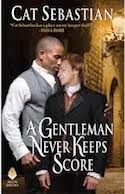
A Gentleman Never Keeps Score by Cat Sebastian (Avon Impulse: historical m/m):
I keep picking up Cat Sebastian’s romances on account of irresistible paradox: they are always profoundly surprising in some way, and at the same time they are consistently, reliably excellent. They stick in the mind: Ruin of a Rake’s intricate social balancing act, It Takes Two to Tumble’s sparkly quasi-supernatural tone, The Lawrence Browne Affair’s Gothic indulgences. And now her latest book, the second about the ramshackle Sedgwick siblings, pairs black boxer-turned-pub owner Samuel Fox with disgraced semi-aristocrat Hartley Sedgwick, as they plot to discover and steal a set of scandalous paintings owned by Harley’s dead benefactor.
You’d think it’s a heist book. But it turns out to be more like a not-heist book — because of course in real life heists are usually an absolutely terrible idea. They’re precisely the kind of terrible idea a person would have if, like Hart, they were trying desperately to feel something other than traumatized by someone they’d trusted who’d hurt them enormously, and whom death had put beyond the reach of any actual punishment or revenge. And if you’re a decent, strong, caretaking type like Sam Fox, carrying around a lot of guilt about the people you’d lost before, you’d go to great lengths to keep someone like Hart from getting hurt any worse than he clearly already had been. You might even, say, help him break into a neglected house where some of that trauma took place, if Hart thought the paintings might be there, and it might help to find them. But mostly you’d do other, ordinary things: bring food, pour a drink, offer an understanding ear. Tell Hart he’s beautiful, make him feel safe.
Somehow, all the not-heisting turns out to be as engaging as a heist would have been. Hart and Sam are amazing on their own but absolute dynamite together: the scene where they meet may be one of my new favorite scenes in all of romance. There’s a lot about sex work and social stigma, racism and homophobia and snobbery and hypocrisy. It’s quite dark, at times, but there’s moments of absolute glory. Occasional romances deal earnestly and deeply with healing the damage left by sexual assault and rape; Courtney Milan’s The Governess Affair, for example. This book gives us a pair of heroes who know what it means to put their bodies and selves at risk for family. It makes it all the sweeter when they finally find each other.
Hartley broke the kiss and buried his face in Sam’s coat, but Sam could tell Hartley was smiling. God, it was a rare gift to have this man in his arms. It made Sam feel like he had been given care of something unspeakably precious and fragile.
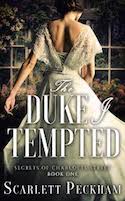
The Duke I Tempted by Scarlett Peckham (NYLA: historical m/f):
I have never read a romance so reluctant to give up its secrets. Everyone is suffering and trying to hide it, from themselves as much as from the reader. And the few who aren’t suffering are up to something. It makes for a somewhat stony beginning — but as soon as one crack appears in the façade, the book becomes irresistible, like watching a ghost-riddled manor catch fire and burn to ash. You fly through the pages as the clock strikes ten, eleven, midnight — and then the book rips away the veil and you whisper holy shit against the darkness.
There was once a flourishing Gothic branch of romance, where women with voluminous nightgowns and voluminous hair fled sinister houses and sinister men by moonlight. Battered paperbacks embossed with names like Victoria Holt and V. C. Andrews were passed around from friend to friend, lurked briefly on the shelves of used bookstores, and then vanished seemingly into the ether. Then all at once the Gothic trend withered on the vine. Nobody quite knows why, and scholars who wish to study this question have trouble tracking down copies. The details of these half-remembered tales glimmer gemlike in memory: a secret room with a dead wife’s corpse locked inside, a peacock feather fan whose ribs are tipped with poison, an unlucky Australian opal that decimates an equally unlucky family. I devoured these books by the bagful, and none of the brooding vampires or burly werewolves of modern paranormal romance can pose a threat half as viscerally terrifying as They say he killed his first wife and now he’s asking me to marry him.
Oh, they’ll tell you this Scarlett Peckham novel is femdom, and it is — once it gets around to it — but in the excitement about that underexplored trope they won’t tell you about all the rest: the fire, the other fire, the secret marriage, the opium, the ballroom that becomes a forest, the iron key our hero wears around his neck, the child with a shock of white-gold hair who bears an uncanny resemblance to another child long dead. It was bone-chillingly spooky and when I wasn’t reading I was laughing with sheer delight.
Gothic romances are tempestuous by definition, but this one is dramatic even by those heightened standards: Archer and Poppy each say and do several things in the course of their marriage that would be unforgivable in a less turbulent book. We’re talking Heathcliff and Cathy levels of mutual desire and damage. If you want characters whose emotional compasses you trust not to lead them too far astray into frank rage and despair, well, you’re going to want to give this a miss. But if you want something to speed your heart and stop your breath as you read beneath the covers, with only the meager flashlight beam warding off the enveloping night — then you have a rare treat in store. Enjoy.
There was a piercing kind of emptiness in being cold to someone who was trying to be kind to you. She had thought it would be satisfying to trouble him but it only made her feel more bereft.
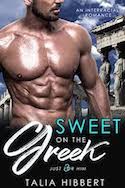
Sweet on the Greek by Talia Hibbert (Nixon House: contemporary bi m/f):
Nik, the Greek pro soccer player hero of Talia Hibbert’s latest contemporary gem, is not terribly bright. He hasn’t had to be: family wealth, stunning good looks, and athletic talent have given him everything he’s wanted. But now an injury means his career is behind him, and the future is a total blank. Nik may not be bright, but he is good, and he wants to do something meaningful, something to help the world.
But first he has to get the love of his life to like him, just a little bit. Just for a little while — say, the rest of their lives. And he has no idea how to go about it. Hence: fake relationship! It’s sure to backfire, and Nik’s just bright enough to know it, but he’s got no better ideas so hey, I’ll pay you to pretend to be my girlfriend at a month-long house party with my twenty best friends! He’s a hero of the type I think of as a Sex Puppy, muscular and rambunctious but inherently sweet and affectionate, like Chris Hemsworth’s Thor or Big Dick Richie from modern cinematic masterpiece Magic Mike XXL. Protective, but not prideful or authoritative — and gosh, doesn’t that feel refreshing in a world that sometimes feels stuffed to the gills with brooding alphas.
Heroine Aria Granger has good reason to be wary of brooding men: her last ex turned out to be someone stalking and trying to murder her best friend. Not a big surprise that she has serious trust issues! She’s questioning everything about herself — her instincts, her intelligence, her worth as a person. To Nik, though, she’s everything: sexy and witty and strong and brilliant and generous. Her deep uncertainty mixed with Nik’s absolute conviction is like nitroglycerin for the heart. This book is a Molotov, this book is a firework, this book will make you want to run around and dance and shout out of sheer joy. It’s funny, it’s filthy, and it’s sharp enough to cut. Run, don’t walk, et cetera.
He slid a hand under her head, cradling her skull, holding her to him as he kissed her again. He couldn’t speak. If he did, she’d hear the truth in his voice, hear the fact that he loved her in every crack and waver. So, instead, he kissed her, and hoped she wouldn’t taste it on his tongue.
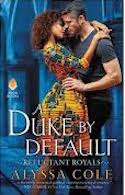
A Duke by Default by Alyssa Cole (Avon: contemporary m/f):
Every now and then a heroine comes along who’s so engaging and so flawed and so marvelous all at once that you wish she was real so you could hang out and tell her how wonderful you think she is. Related: let’s never stop talking about Portia from A Duke by Default.
We first met Portia Hobbs as the hot mess best friend in book one of the Reluctant Royals series: she was funny and brilliant but she drank way too much and hooked up constantly and nearly messed everything up when she found out Thabiso was a prince. Now she’s landed a swordsmithing apprenticeship at a Scottish armory, as part of what she calls Project: New Portia, which is all about giving up booze and men and trying to figure out what the hell she’s going to do with the rest of her life. Her parents are driven and wealthy real estate tycoons, her twin sister Reggie runs a geek media empire from her custom-designed wheelchair, but Portia…Portia, according to her mother, is a “Jill of all trades, master of none.” The family dynamics here are so realistically painful that I had to read these scenes with my hands half over my eyes, cringing with the best kind of shared agony. If you know what it feels like to disappoint someone you love even though you’re trying your hardest, Portia’s your girl. I cried for her. I raged for her. And I loved her with my whole heart.
In a desperate effort to prove her competence, Portia pours herself into the armory, beefing up their social media and redesigning the website and oh yes, unearthing the fact that her boss (and our hero) is really the long-lost illegitimate heir of a royal duke. Tavish “Here’s My Eighteen-Inch Length of Steel” McKenzie is a silver fox Scottish-Chilean swordsmith who’s happiest in the shadows, so the title upends everything comfortable and familiar in his life, even as it gives him position and power enough to have real influence to make changes for good in the world. It’s tough on everyone, and the drama is riveting. This is a long, tense, slow burn of a romance: I almost worried — almost! — that they weren’t going to make it in time. We were racing toward the end of the book, and they still had not gotten their shit together! And Tavish was going to be meeting the Queen! And then the Queen was there and and and — and it’s a moment so spectacular, so jaw-dropping, so Peak Romance, such a gift to those who love this genre that I can’t even tell you what happens. You’re just gonna have to read it for yourself.
Now that she was here, the entire plan seemed ridiculous.
- Go to Scotland.
- Make swords.
- …?
- Prosper?
This Month’s Hot, Savory Romance to Make Your Mouth Water
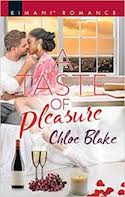
This Month’s Hot, Savory Romance to Make Your Mouth Water: A Taste of Pleasure by Chloe Blake (Harlequin Kimani: contemporary m/f):
As you value your life and your reason, stay away from this book when you’re hungry. Genre fans know the secret: many of romance’s most decadent moments aren’t about sex at all. They’re about food. Many authors who write sex scenes with plain language and precise choreography will drop all realism and restraint to lavish hyperbole on an entree or a dessert or a glass of good wine. Food, like sex, is an ephemeral art form: you shop, you prep, you enjoy it — and then it’s gone. Category romances are a little ephemeral, too: short, swift stories designed to pack the maximum amount of punch into the minimum amount of book. Most of them are potato chips, briefly savory as they melt away, then you’re reaching for the next one. This slender little masterpiece, though, is lush and rich and complicated and memorable. Full of places and people and meals and wine. Bigger on the inside. It’s like a top chef’s best amuse-bouche, and I couldn’t have loved it more.
Toni is a perfectly cromulent hero — hot Italian winemaker with a troubled teen daughter and a troublemaking ex — but what I loved most about him was how completely he was into our heroine from the moment they met. Because Dani, our curvy black chef heroine with a temper and a weakness for terrible men, is an absolute marvel. She’s been working as a ghost chef, earning Michelin stars while her truly shitty on-again, off-again boyfriend claims all the credit for her work. Some sterner readers might be put off that she semi-cheats on him with the hero at the start of the book, but Andre so deserves cheating on, and Toni is so clearly a Fun Time Ready to Go, that I found myself actively rooting for Dani to let her guard down and just hit that already. In addition to the solid chemistry and great banter, we have a whole bundle of complex and beautifully rendered secondary characters (Dani’s driven, regal supermodel mom being a particular favorite) who help make this book feel like a complete world, briefly glimpsed. Good news: it’s a series!
Men, she thought. Watch, he is going to eat my whole dinner. Toni reached for a little plate and loaded it up with portions from each dish, taking care to select the best cuts, just as she would. Then he held it out for her to take.